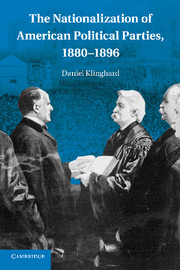Book contents
- Frontmatter
- Contents
- Preface
- Acknowledgments
- Introduction
- 1 Localism and the Jacksonian Mode
- 2 The Nineteenth-Century Associational Explosion and the Challenge to the Jacksonian Mode
- 3 Organizational Transformation and the National Parties
- 4 National Campaign Clubs and the Party-in-the-Electorate
- 5 Grover Cleveland and the Emergence of Presidential Party Leadership
- 6 Party Transformation in the Republican Party
- Conclusion
- Selected Bibliography
- Index
- References
6 - Party Transformation in the Republican Party
Published online by Cambridge University Press: 06 July 2010
- Frontmatter
- Contents
- Preface
- Acknowledgments
- Introduction
- 1 Localism and the Jacksonian Mode
- 2 The Nineteenth-Century Associational Explosion and the Challenge to the Jacksonian Mode
- 3 Organizational Transformation and the National Parties
- 4 National Campaign Clubs and the Party-in-the-Electorate
- 5 Grover Cleveland and the Emergence of Presidential Party Leadership
- 6 Party Transformation in the Republican Party
- Conclusion
- Selected Bibliography
- Index
- References
Summary
Party transformation in the Republican party took a different course from that pursued by nineteenth-century Democrats, although it was shaped by the same emergent idea of party. Two differences between the parties stand out. First, Republican party change centered on alterations to convention rules, which opened up new strategic practices for Republican presidential aspirants. In particular, Republican candidates proved more innovative with novel forms of presidential rhetoric than did Democrats in the 1880. Second, with a greater range of “available” presidential aspirants, the Republican party saw a greater variety of approaches to presidential party leadership.
Republican convention reforms reflected the broader party system's repudiation of Jacksonian-mode republicanism. Instead of restraining presidential ambition by forcing presidential aspirants to work with subnational political leaders, the Republicans' revised convention process encouraged presidential contenders to appeal directly to the party-in-the-electorate by expanding the clout of nationally dispersed constituencies and weakening the ability of state organizations to control their national delegations. The reformed process provided opportunities for presidential contenders to broadcast their positions, and thus to build up popular constituencies. This serviced the campaign of education by providing the parties with an educator-in-chief who could take on the difficult work of articulating party commitments in a complex political environment. Convention reforms, in this sense, paved the way for the presidential direct primary in the early 1900s. The impetus behind both reforms was quite similar – both allowed voters to bypass subnational party leaders, accessing national conventions more directly.
- Type
- Chapter
- Information
- The Nationalization of American Political Parties, 1880–1896 , pp. 191 - 234Publisher: Cambridge University PressPrint publication year: 2010



